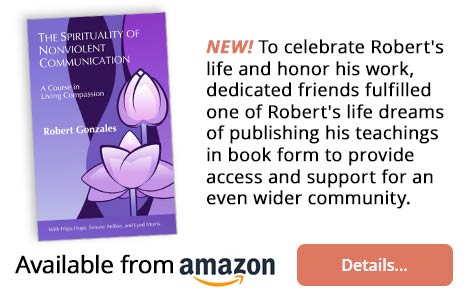

Welcome to the Robert Gonzales Training Legacy. Here you can learn more about Robert and the powerful teachings he dedicated his life to. NVC Academy is proud to house and share with you the complete body of his life's work. We invite you to explore, learn, and help keep his legacy alive!
Robert's passion was in the spirituality of the Nonviolent Communication (NVC) process. He saw NVC both as a process that helps people connect more authentically with themselves and others, and as a spiritual practice and way of living. The worldwide NVC community mourned when Robert died in 2021. He left behind a legacy of work that emerged from a lifetime of inquiry into the intersection between spirituality and human communication. More about Robert.
Practice Exercise
4-6 minutes
You value generosity and you often give easily from the heart. There are those times, however, when you get snagged by a sense of obligation. You feel tense and resentful. You don't want to continue with this attitude, but how can you reconnect with the desire to give from the heart? Let’s touch on three essential elements that support giving from the heart: choice, mourning, and acceptance.
Details...Practice Exercise
6-9 minutes
How to get past the sting of a painful comment? Get empathy from self or another. Then connect with the commenter's feelings and needs. The more you can do this the less personally you may take it. Then work together on specific, do-able, authentic agreement about doing something differently next time, the kind that will enable you both to shift out of reactivity. Three things need to be in place for that to work.
Details...Trainer Tip
1 - 2 minutes
Trainer Tip: The better you connect with your child’s needs, the more you will defuse the power struggle. If he wants to behave in a way you don't like, start by understanding what's going on with him by making empathic guesses. Doing this out loud can expand your child’s emotional vocabulary and show that his needs matter to you, and build his trust. Once you learn what's going on with him, create a strategy that values both your needs.
Details...Article
12-18 minutes
Most people want to punish perpetrators of sexual violence. Unfortunately, punishment doesn’t lead to lasting widespread change. Rather, we can identify root causes and conditions that sustain violence. That means shifting from individual to systemic lenses, and from punitive to restorative responses. It means collective learning about how such acts are nurtured and persist. This can reduce the chance of it happening again.
Details...Practice Exercise
4-6 minutes
Confidence, flexibility, creativity and equanimity may become more possible when you would like someone to meet a particular need, can trust that you can meet that need with someone else, and can accept a “no” to your requests. You can allow grief or disappointment to arise, and naturally turn towards a relationship in which those needs can be met. In some cases this may lead to the dissolution of a partnership or friendship.
Details...Trainer Tip
1 - 2 minutes
Trainer Tip: Notice when you're tempted to wield physical, emotional, and intellectual power to get your children to do what you want. This coercion or force may bring short term ease, but long term it can be counterproductive. Ask yourself “What do I want my child to do?” and “What do I want my child’s reasons for doing it to be?”. Then consider ways to help them connect to their intrinsic motivation for doing it.
Details...Article
10 - 15 minutes
The word "privilege" signifies the benefit to the person having it, and the relationship between that person’s benefit and others' lack of benefit. When privileged, there are incentives to not see this interdependent link. For instance, it's easier for the wealthy to think of the poverty of many and the wealth of some are unrelated. If the wealthy want to keep wealth they would need to continue with approaches rooted in this separation.
Details...Practice Exercise
3 - 5 minutes
Part of making your relationship a priority while maintaining autonomy means you consider the impact your actions may have on your relationship and look to negotiate ways all needs can be honored. To do this while not losing yourself, practice writing down your needs and guessing their needs beforehand. Make an upfront request to create a shared understanding about what’s most important, before discussing strategies or decisions.
Details...Article
22 - 31 minutes
Whether we have more or less power and privilege, anything without liberation for all is within patriarchal separation, and will continue cycles of oppression. To liberate ourselves and one another we need to increase our collective capacity through developing related knowledge, skills, research; build an understanding of patriarchal roots; confront lovingly; co-hold dilemmas about privilege; co-shape outcomes; etc.
Details...Practice Exercise
3-5 minutes
Anger is a sign that you're resisting what's happening because you perceive an overwhelming threat, not trusting yourself to handle what's happening directly. Vulnerable feelings under anger are usually fear, hurt, or grief. Experiencing and expressing these feelings and connecting them to your needs, gives you access to more skill, insight, compassion, and wisdom. Read on for 3 questions to ask yourself when angry.
Details...

